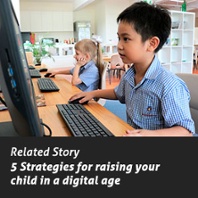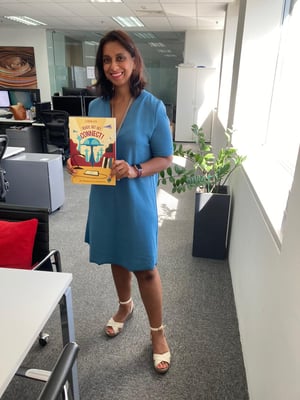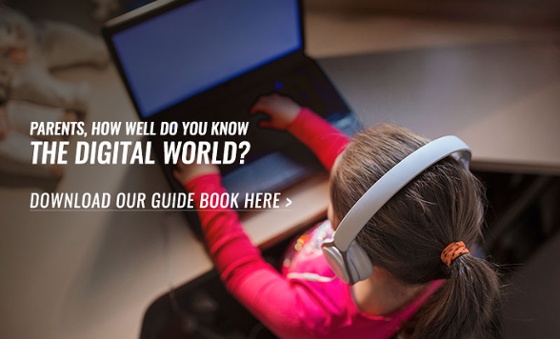-1.png)
EtonHouse Singapore
Children have increasingly been spending time online, especially with home-based learning introduced during the circuit breaker. The digital world provides a wonderful platform for children to learn. However, there are also risks and challenges involved when learning happens online. Children may unknowingly reveal personal information and become victims of cyberbullying or access inappropriate content.
How do we keep our children safe? We find out more from Nina Bual, who is an in-house entrepreneur at The Creative Square Company. Nina has supported organisations in reducing cyber risk through awareness and online training.
You can listen to the podcast here.
What are the biggest cybersecurity threats to children?
One of the biggest affecting factor is that our children are not being policed in the cyber world and people on the internet have their own agendas. Therefore, what your children see on the internet may not be in line with your belief and value system at home.
These threats can be categorised by the following:
- Software threats, installation threats, viruses and trojan horses causing your computer to malfunction because children tend to want to get straight onto that computer without updating it.
- Cyber crime scams and phishing. Children who shouldn't have email addresses now require them to subscribe to many things on the internet. This leads to scam and phishing emails of which they may not fully understand the risk when being exposed to it.
- Cyber criminals or groomers are a threat to minors and can lead to many exploitations and crimes.
When and how should parents discuss cybersecurity with children?

It can begin from the moment you switch on the wifi to download a game for a 2 year old. Also, if your child is able to access YouTube where you will not be able to be beside them all day and monitor what they do and the content they are exposed to. As such, the same age you would have a conversation with your child about 'stranger danger' would be the same age to start these conversations about cybersecurity.
Ages 4 and up would be ideal to have conversations that aren't too complex yet making them aware of things like sharing their identity on the internet and using a pseudo name when registering to a game. Also, make it known that when they come across something on the internet that scares or confuse them, they should ask you about it.
Could you share some imminent dangers that we need to be aware of and plug immediately?
- Following in your footsteps: parents having the same password that is used for all devices and log-in will influence your child's cyber behaviour. They will then tend to use the same password for all their online log-ins and that makes it easier to have their accounts hacked.
- Overfamiliarity- if children are not asked to control what they're discussing online and who they're discussing with, they are leaving themselves very exposed.
- Peer pressure- they can be influenced by the behaviour of their friends and want to to get onto certain things online that their friends are on that isn't safe. We need to be aware of cyber bullying and educate them about it.

Parents should be aware of the appropriate age range for certain applications. One tool I always recommend is common sense media. Whenever my eight year old wants a new app, we go into common sense media. We see what the adults and children think about it and the decision is made together based on the app. Children need to be included in the dialogue as they need to know why you'll say no to certain things and why you're okay with other apps as it can be confusing for them.
What are some of the ways we can keep our devices safe from cyber-attacks?
There are simple techniques in staying safe online. With our Cyber Lite books, it helps children take control of their digital lives by understanding the world of cyber space.
Children should learn to view every email as a quiz and whether it's worthy of opening beforehand, the people who have your email address should be people in your community or your school. If it isn't, it is definitely a spam email and could be dangerous.
Could you share more about the Cyber Lite books and resources?
I started working in cyber security awareness about two years ago. I wanted to make talking to children about cybersecurity interesting. How can we communicate with children and make it more engaging? How can we make it fun? Which was what we did with Cyber Lite books. 
We came up with an interactive activity book where you can meet different characters you'll meet in cyber space. We have the fishing(phishing) family, the Kingfisher, the Angler fish, etc. You also meet the fakers, the 'fake news' guys, the 'two-faced' people and different types of cyber bullies. The book includes activities and games hence they are engaging on a level of a comic book, but also important tools to keep them safe. The book is aimed between the ages of 8-12 years because we found in terms of cyber awareness, that's the age of compliance. The other thing we've ventured into child abuse. It is really hard to talk to children about child abuse. We have very gently talked about groomers, making them into characters that are comical but fearful, showing them that there are people behind our screens who look this gruesome.
This allows parents to have the conversation on cybersecurity with their children. It teaches children how think critically. It is a useful resource for parents to share with their children and discuss it together, or allow the child to work through it by themselves. 

.png)